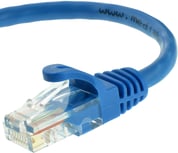Why should I connect via Ethernet instead of wifi?

In this day-and-age, our phones are getting smarter, our tablets are getting thinner and our computers are getting smaller. The advances made with today’s technology, specific to the internet, may cause some confusion for the everyday user when it comes to getting the most value from their service and choosing between different connection options like Ethernet or Wi-Fi.
This blog gives you important insights on what Ethernet and Wi-Fi connections are, the advantages and disadvantages of both and provides guidance on how to choose which option is better for you.
What is Ethernet?
Ethernet is a wired connection and the most traditional technology used – this was used before Wi-Fi became an option and is still used today. Because the connection is wired, a physical cable is needed to connect your devices to the internet.
This connection is most commonly used in company offices, school campuses, hospitals and banks which are considered Local Area Networks, or LANs.
What is Wi-Fi?
Unlike Ethernet, Wi-Fi doesn’t need a cable connection because the signals travel wirelessly. This connection is literally everywhere, and chances are you have experienced this on numerous occasions. It’s easy to see how this type is the most popular of the two connections.
Consumers use Wi-Fi on their smartphones, tablets, in coffee shops, airports and streaming media such as Netflix or Hulu. Because the connection is wireless, it allows access to be granted virtually anywhere and to anyone who has the network credentials.
Ethernet versus Wi-Fi – the advantages
I bet you’re wondering, with the availability offered through wireless connection with Wi-Fi, why is Ethernet still an option? Why haven’t schools, companies and hospitals switched to a wireless connection? The answer is simple, and the main reason as to why Ethernet is still a valuable option – speed, reliability and security.
SPEED
Because Ethernet uses a cable connection, your device must be connected with the physical cord to gain access to the internet, meaning the cord protects the cable wires from interference – unlike Wi-Fi, which transmits waves through the air that can be accessed by numerous users. Your LAN will be the only devices able to connect, allowing less interference, which keeps your connection relatively fast.
RELIABILITY
Ethernet is more reliable than Wi-Fi because the connection is less vulnerable to disruptions or interference. With the waves being transmitted through the air in wireless connections, you are more susceptible to disruptions because your waves must fight through traffic with other networks (i.e. your neighbors’ Wi-Fi or other customers in the coffee shop) and even travel through obstacles like walls and buildings.
Have you ever received a better connection on one side of your house than the other? Or see someone walk around holding their phone in the air looking for a signal? This is from the noise and interference the waves are competing with.
As a result, Ethernet becomes more reliable with a stronger connection due to the physical cabling connected to the device.
SECURITY
One of the most important things to be mindful of when using the internet is security. There are endless threats while surfing the web, sending emails and downloading files that could harm your computer or steal personal information stored on your hard drive. This is a major downside to Wi-FI connections.
Wi-Fi is prone to security breaches even if your network is password protected. Because the waves travel through the air and can be connected to any user, it’s easier for your connection to be breached or hijacked from unsanctioned users. As mentioned earlier, in order to connect through ethernet you must use the physical cabling which makes potential security breaches more difficult.
Why use Wi-Fi?
There are some advantages to Wi-Fi that make it a better option. Because Wi-Fi uses wireless signals, it allows you to access the internet anywhere, with any device that has wireless capability (i.e., your smartphone, tablet, laptop, gaming system). Unlike ethernet, which has less mobility because of its physical connection to it's internet source, Wi-Fi is more convenient for those on-the-go — which still makes this option the most popular.
OUR ADVICE?
In addition, for data sensitive networks like banks, schools, company offices and hospitals or medical offices or if you work from home, internet connection via Ethernet cord is often a very viable.
| If you choose to get an ethernet cord (or more than one) for your home or business from a common retailer like Amazon, Best Buy, Target or Walmart, be sure to look for something that has a tip that looks like the one to the right. |
|



